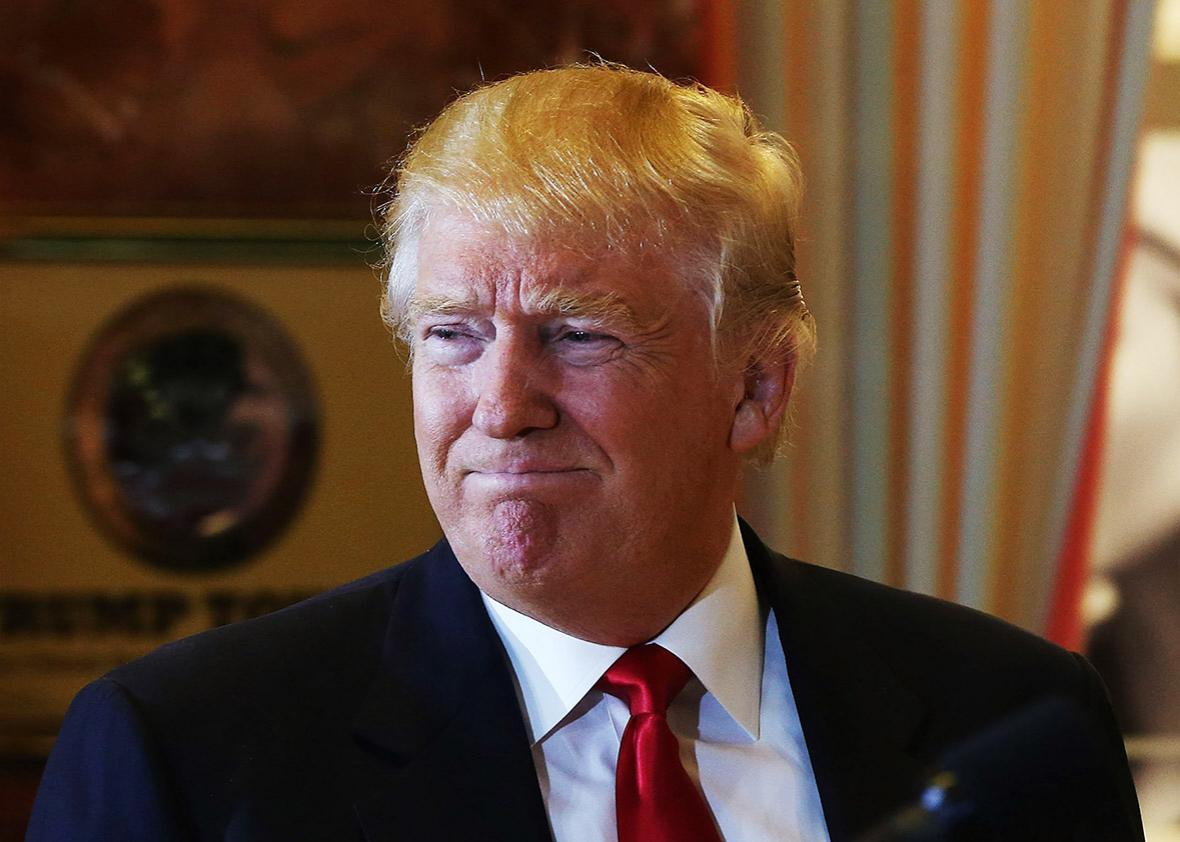Donald Trump, to his credit, makes himself readily available to the press. This does not always mean that the press always makes the most of Trump’s availabilities or that Trump uses the time to offer thoughtful responses. At his not-infrequent press conferences, Trump typically babbles about his greatness and the weakness of his opponents, and the press laughs along with the shtick, gets its quotes, and moves along.
Tuesday’s conference was different. It was contentious and uncomfortable, which is to say it was the best Trump press conference yet. The whole reason Trump was testy was that the press had held him accountable over something material and meaningful to the lives of others.
Tempers flared on both sides. Trump frequently lambastes the press but usually from his dais at large rallies, leaving members of the press with little recourse other than to keep an eye for incoming spit, tomatoes, batteries, or other projectiles from the inflamed crowd. On Tuesday morning in Trump Tower in New York, though, he did it right in front of their faces. “The press should be ashamed of themselves,” he said to the group sitting about 10 feet away. “I have never received such bad publicity for doing such a good job.” The press was “disgusting” and “dishonest,” and one reporter—ABC News’ Tom Llamas—was singled out as a “sleaze.”
The argument was over donations to veterans’ charities that Trump promised in late January. Trump, you may recall, opted to skip the final debate before the Iowa caucuses over what he believed was a disrespectful statement from that debate’s host, Fox News. He counterprogrammed the debate with a fundraiser for veterans’ charities. At the time, Trump made a great show of how he had successfully raised more than $6 million for vets. Later some news organizations, led by the Washington Post, tried to track the money and could see that only about half the amount Trump purported to raise had been disbursed. The Trump campaign responded to inquiries about the gap largely by stonewalling reporters requesting a full accounting, or offering lower estimates than what it had claimed to have raised at the time. Only last week did Trump cut the $1 million check he had said he personally would donate—and it appears that wasn’t the only check that went out just last week.
Trump used the press conference to offer that full accounting of donations, which was all reporters asked to see in the first place. He read aloud each of the 41 groups to whom he had donated and how much had been disbursed to each. The final tally was $5.6 million—still short of the number he had originally claimed he’d raised but close enough to it that further inquiries into the matter might come across as nitpicky. (He argued that more would be coming to get the tally over $6 million.)
Semi-long story short: The press performed admirably and forced a presidential candidate to bend to public pressure by asking good questions. If a candidate claims to have raised $6 million for veterans’ charities but there’s no clear indication that $6 million has been disbursed to veterans’ charities, it’s the press’ job to determine what the hell is going on. One option for the candidate in question is simply to offer the reporters asking the questions what they’re looking for. Another is to complain about how the press keeps asking and eventually, after the missing money has become a narrative of some concern to the candidate who consistently pledges to “take care of the vets,” to turn over that (mostly) full accounting while calling the press a bunch of scumbags for ensuring that veterans’ groups received the money pledged to them. “Stop using veterans as political pawns,” Al Baldasaro, a New Hampshire state representative and former Marine who spoke on Trump’s behalf at the press conference, instructed both the media and the Clinton campaign. The entire purpose of the inquiry, though, was to ensure that Trump wasn’t using veterans as political props.
This was accountability journalism done properly. So no wonder, then, that the reporters in attendance were so willing to push back against the insults directed their way. “You seem to be resistant to this kind of scrutiny, the kind of scrutiny that comes with running for president of the United States,” said CNN’s Jim Acosta, whom Trump then mocked as a “real beauty” on TV. Llamas was branded a “sleaze” for asking about the gap between the $5.6 million and the $6 million in donations. His question: “You said you had raised $6 million. Clearly you had not. Your critics say you tend to exaggerate and have a problem with the truth. Is this a prime example?” Fox News’ Carl Cameron asked why Trump was treating questions as attacks, while another reporter asked him if he would need thicker skin as president.
But worry not for the insulted reporters. They—well, most of them—can suffer being called mean names, even if the candidate himself cannot. Belligerence in reporters’ faces is a sign that the reporters in question have done something worthwhile and, by applying pressure, forced an insecure public figure to bend. “I’m going to continue to attack the press,” Trump said when asked whether this is what every day would be like in his White House. And that sounds great. The less Trump gets along with the press corps, and the more the press corps doesn’t care because they have the facts behind them, the better.
